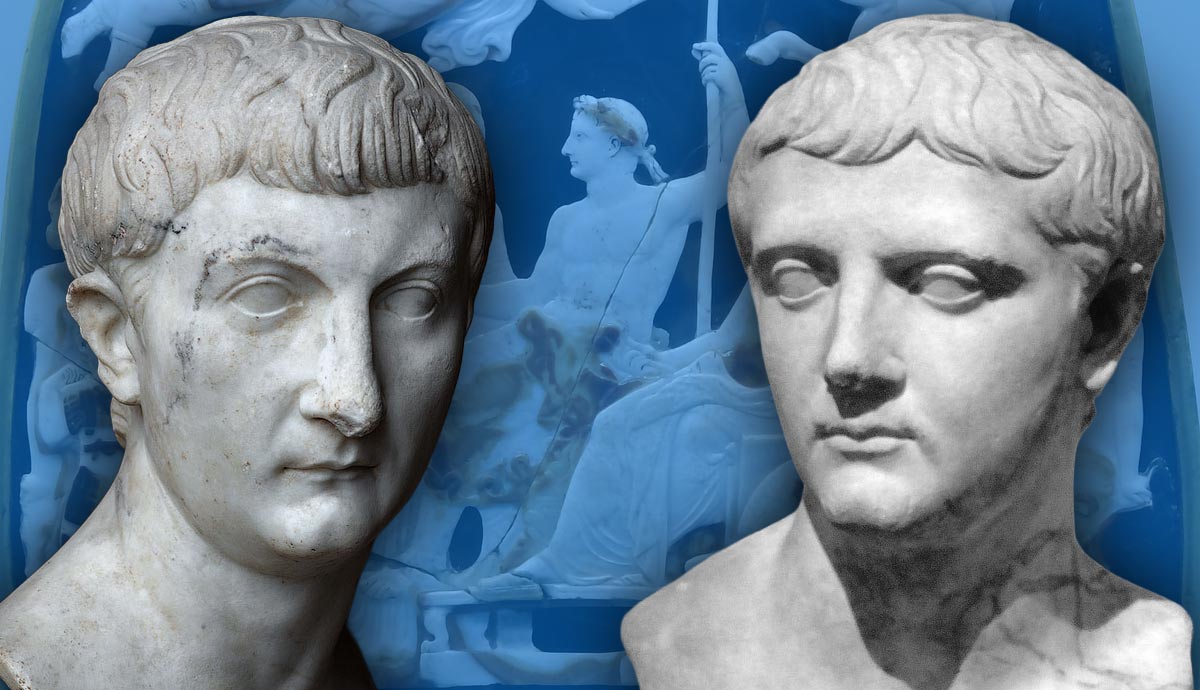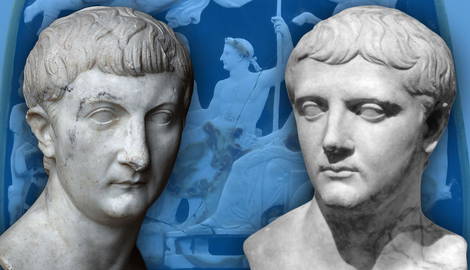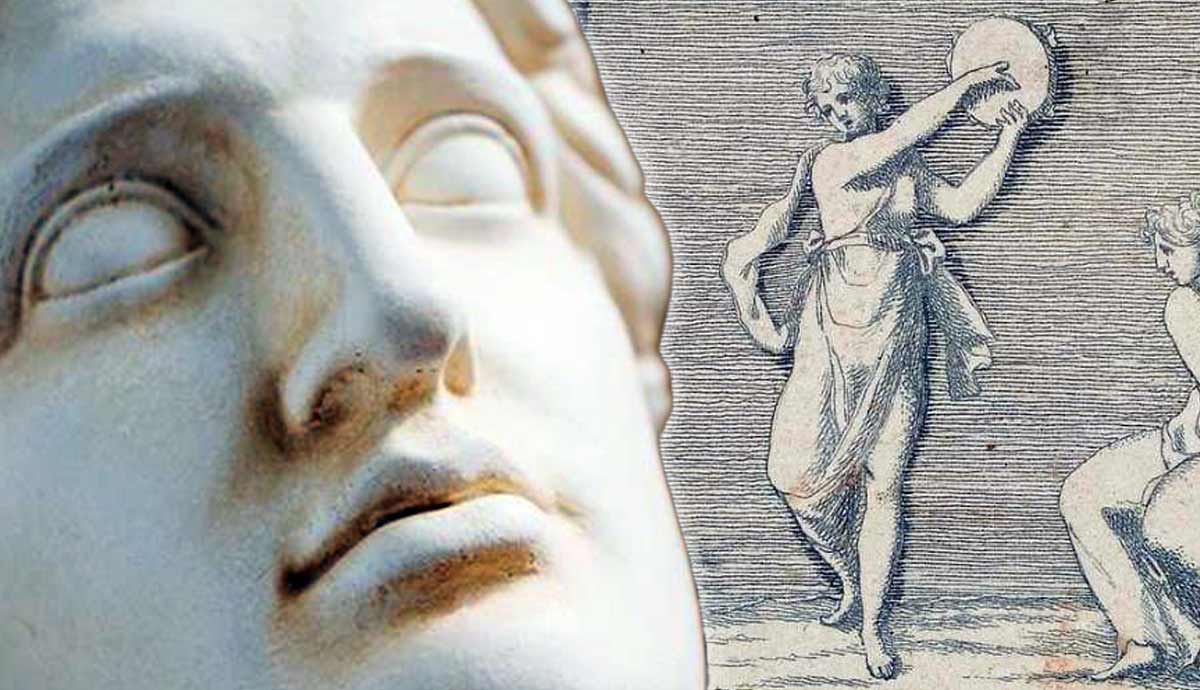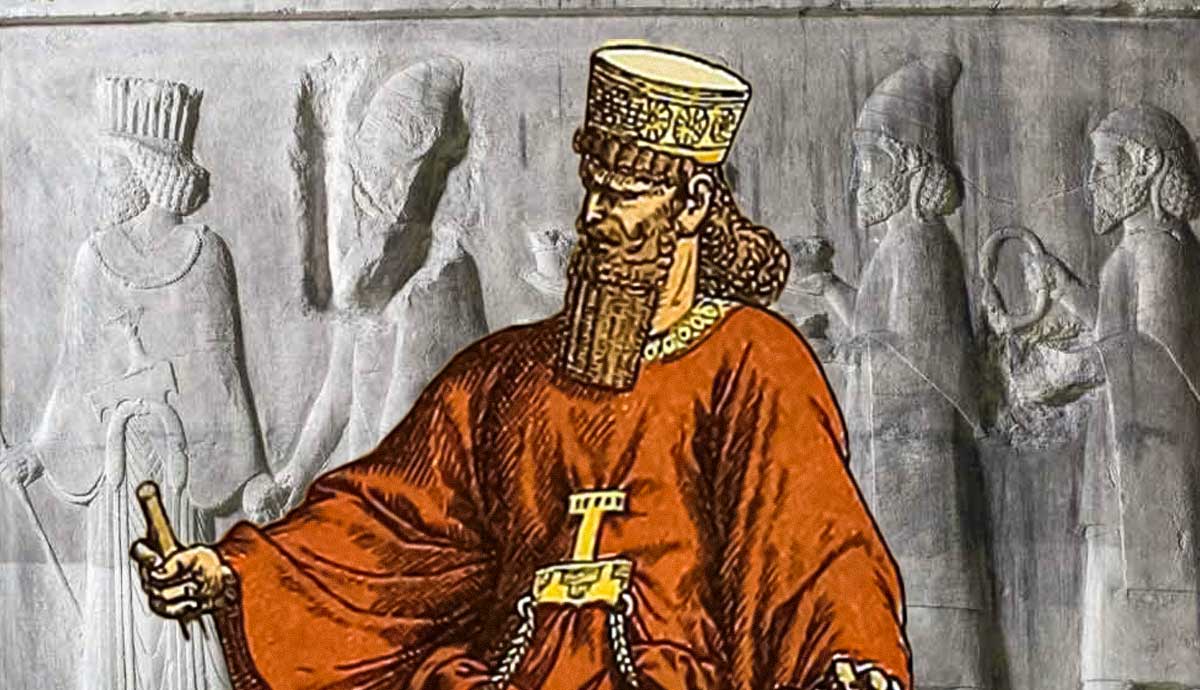
The Julio-Claudians were the first dynasty of imperial Rome, descended from the Julian gens through Julius Caesar and Augustus. The Claudian side came through the empress Livia, herself a Claudian, and her ex-husband Tiberius Claudius Nero, whose name is preserved by three of Rome’s first emperors. There were many imperial princes: male members of the imperial family groomed for power and military service. Two of the most important were Claudians named Drusus.
Drusus the Elder was one of Rome’s most important generals. Drusus the Younger was one of the dynasty’s most prominent heirs. However, their stories are often overlooked as the reigning emperors preferred to emphasize their Julian credentials and links to Augustus. Meet the Drusi: the forgotten Claudian princes.
The Claudian Gens: Tiberius Claudius Nero

Tiberius Claudius Nero was a member of the prestigious Claudian gens, with aristocratic roots deep in the ancient Roman Republic. He was starting his political career when the civil war that ended the Republic broke out. He served as a questor under Julius Caesar in 48 BCE and joined him in the Alexandrian War against Pompey. But after Caesar’s assassination, Claudius Nero sided with the conspirators, suggesting they be rewarded for their service to the state.
In 43 BCE, he married Livia Drusilla, the daughter of the patrician Marcus Livius Drusus Claudianus, another member of the Claudian gens. Her father also sympathized with the conspirators and committed suicide alongside Brutus and Cassius following their loss at the Battle of Philippi in 42 BCE. Shortly after their marriage, Livia had their first son, Tiberius.
With his new wife and young son in tow, Claudius Nero chose Mark Antony’s side in the newly emerging civil war and was forced out of Rome. But in 39 BCE, amidst peace talks between Octavian and Antony, Claudius Nero returned to Rome with his young son and now pregnant wife.

According to the sources, Octavian immediately fell in love with Livia when he met her in aristocratic social circles. Octavian divorced his second wife, Scribonia, on the day she gave birth to his daughter Julia in 39 BCE. He also convinced Claudius Nero to divorce the pregnant Livia. She gave birth to Claudius Nero’s second son, Decimus Claudius Drusus, on January 14, 38 BCE. Octavian then married Livia on January 17, with Claudius Nero giving her away in place of her father.
This suggests that while Octavian and Livia may have been in love, the union was also political. Octavian was trying to rebuild stability among the aristocracy following years of civil war. The Claudii were prominent among his opposition, and the match showed a new accordance.
Claudii Princes in the House of Augustus

When Claudius Nero and Livia divorced, the two young boys, Tiberius and Drusus, stayed with their father. When he died in 33 BCE, the nine-year-old Tiberius and six-year-old Drusus were sent to live with their mother, coming under the guardianship of Octavian, who would adopt the name Augustus in 27 BCE when his position in Rome was fully consolidated.
All the evidence suggests that Augustus treated the two young boys as his own. In 29 BCE, Tiberius rode with Augustus in his triumphal chariot for his defeat of Antony and Cleopatra at Actium. According to the sources, the young Tiberius was dining with kings alongside his stepfather and conducting public religious ceremonies. Drusus seems to have been considered too young to be involved in the triumph, but rumors that Augustus was Drusus’s real father circulated, pointing at a closeness between the two.

Augustus may have considered the Claudii boys as potential heirs. He first looked to his maternal nephew Marcellus, who died in 23 BCE, and then his trusted friend the general Agrippa. But he was still preparing the Claudii boys for power. In 27 BCE, Tiberius accompanied Augustus and Marcellus to inspect outposts in Gaul and start his military education. In 24 BCE, at just 17, Tiberius entered politics receiving the position of quaestor. He was granted the right to stand for election as Praetor and Consul five years before the usual minimum age. Drusus received the same honor in 19 BCE. In 20 BCE, Tiberius accompanied Augustus to the east, leading troops and making a name for himself against the Parthian Empire. Then, at just 22, he was given leadership of a sizable force to restore Rome’s client king in Armenia.
Favorable marriages were also arranged. Tiberius married Vipsania Agrippina, Agrippa’s daughter. When their first son was born in 14 BCE, Tiberius broke with tradition by naming him Drusus after his brother. Drusus married Antonia Minor, the daughter of Mark Antony and Augustus’s sister Octavia. Drusus had several children including the future general Germanicus and the future emperor Claudius.
Drusus the Elder’s Military Campaigns

In 17 BCE, Germanic warriors crossed the Rhine and started pillaging in Roman Gaul. The Roman general Lollius set out to hunt down the perpetrators, but he was ambushed and his standard seized. In response, Augustus replaced Lollius with Tiberius as the governor of Tres Galliae. He also appointed the now 23-year-old Drusus to lead the supporting campaign to annex northern Italy, the Alps, and the lands up to the Rhine and Danube.
Drusus quickly demonstrated that he shared his brother’s military capability. In 15 BCE, he swept through northern Italy, defeating the Raeti at the Battle of Tridentum and then entering the Alps from the south to mop up rebels. He then joined with Tiberius to engage the Vindelici, a tribe in southern Bavaria near the Danube River. They then marched eastward and annexed the kingdom of Noricum in modern Austria. Drusus then took up the position of governor of Tres Galliae while Tiberius led new campaigns in Illyricum.

Now commanding along the Rhine, Drusus spent two years building up his military forces for a major campaign against the Germans. Fortresses were built along the river connected by military roads, and a canal was constructed to access the North Sea. Drusus also established the imperial cult altar to Augustus and Roma at Lugdunum, the capital of Tres Galliae.
Drusus began his German assault in 12 BCE, crossing the Rhine to engage the Sugambri and the Usipete tribes, swiftly neutralizing them. He then launched a daring amphibious attack, sailing down the Rhine with four legions and forcing the Cananefates and Frisii to pay tribute. Drusus also engaged the Chauci and forced them to sue for peace before returning across the Rhine for the winter.

In 11 BCE, Drusus crossed the Rhine again, following the Lippe River north, penetrating deep into the lands of the Usipetes, Sugambri, Marsi, Bructeri, and Cherusci. He built several forts and a bridge over the Lippe. The Romans wintered on the far side of the Rhine for the first time.
While Drusus’s troops were challenged as they crossed back over the Rhine, upon arrival in his main camp, Drusus was hailed “imperator” by his troops. This was a traditional honor bestowed on a military leader by his citizen-soldiers for bringing them an exceptional victory and not yet associated with imperial power. He had further successes against the German Chatti tribe in 10 BCE, who would become one of Rome’s longest-standing enemies. In 9 BCE, Drusus was elected consul in Rome in recognition of his success and then returned north to continue his campaigns.
Sadly, not long after his return, Drusus fell from his horse and suffered grave injuries. Tiberius immediately rode from his post in Pavia to see his brother, arriving just in time to hear his last words. The grieving Tiberius accompanied the body to Rome, where Drusus received a public funeral and was interred in the Mausoleum of Augustus.
Drusus the Dioscuri

Tiberius took over responsibility for Drusus’s German command, for which he celebrated a triumph in 7 BCE. As part of the celebration, Tiberius received permission to rebuild the temple of the Dioscuri in Rome, which he dedicated jointly in his name and that of his brother Drusus. In Greek Mythology, the Dioscuri brothers Castor and Pollux were considered the epitome of brotherly love and devotion.
The death of his brother seems to have greatly affected Tiberius. Augustus was lining Tiberius up for the succession. Tiberius was granted a triumph and his next consulship in 7 BCE. In 6 BCE, he was given tribunician power, which Augustus had only previously shared with Agrippa. That same year Augustus was preparing to send Tiberius east to take control of that half of the Empire. But rather than accept the command, Tiberius suddenly and unexpectedly withdrew from public life and retired to Rhodes.

Tiberius’s decision apparently surprised Augustus, who now looked at his biological grandsons Gaius and Lucius Caesar as heirs. Sadly, both youths were dead by 4 CE before reaching the age of 25.
Tiberius was recalled to Rome to occupy the position of successor, a role that he seems to have accepted but not relished. When Tiberius was adopted by Augustus in 4 CE, becoming Tiberius Julius Caesar, he also adopted the oldest son of his brother Drusus. Since his father’s death, he was now known as Germanicus, a unique title awarded to Drusus posthumously that would later be widely imitated.
Drusus the Younger: Early Life & Career

The young Drusus, born Nero Claudius Drusus on October 7, 14 BCE but known as Drusus Julius Caesar following his father’s adoption into the Julian gens, was brought up as an imperial prince. He was a trusted member of the imperial family who was trained for public office and military leadership.
Just as Tiberius and Drusus the Elder had accompanied one another’s political careers as a pair, and later Gaius and Lucius Caesar were treated as a pair of heirs, Drusus the Younger was groomed alongside his cousin Germanicus. The son of Drusus the Elder, Germanicus was a year older and treated as the senior of the pair.
As had become the custom for imperial princes, Drusus took his first office, quaestor, in 10 CE while Augustus was still alive and was granted permission to run for subsequent offices five years before the normal age. Meanwhile, by this time, Germanicus was already leading legions as part of Tiberius’s campaigns against the Pannonians and the Dalmatians. Germanicus stood alongside Tiberius in his triumph in 12 CE, displaying triumphal ornaments, while Drusus’s presence in the triumph seems to have been minor.
When Augustus died in 14 CE, with Germanicus away, it fell to Drusus to recite a public eulogy for the beloved emperor. Both Germanicus and Drusus were included in the new priesthood of Sodales Augustales for the now-divine Divus Augustus.
Military Profile

While Drusus must have received some military training while Augustus was still alive, we first hear of Drusus engaging with the military as part of the revolts that followed Augustus’s death. Drusus was part of the delegation sent to Illyricum to help Germanicus deal with the troops revolting there. He then traveled to Pannonia along with the Praetorian Prefect Sejanus and two Praetorian cohorts to deal with the revolt there.
Drusus was already consul designate when Augustus died and took up his first consulship in 15 CE. As consul, Drusus hosted gladiatorial games in Rome in his name and that of Germanicus, helping boost the popularity and joint image of the pair with the public. However, he also gained a reputation for enjoying the games a little too much and getting involved in riots and disputes.
The following year he was sent to Illyricum as governor where he served until the end of 19 CE. He led a successful campaign against the Marcomanni in 18 CE, for which he received a triumphal ovation when he was recalled to Rome shortly after the death of Germanicus in 19 CE. When he returned, Drusus also met twin sons he had fathered with Livilla, his cousin and the sister of Germanicus. They were named Tiberius Gemellus and Germanicus.
The Heir Apparent

With Germanicus’s untimely death in 19 CE, Drusus was left as sole heir. This was cemented with a second consulship in 21 CE with his father as his colleague. In 22 CE, Drusus was voted tribunician powers alongside Tiberius. Augustus had previously done this with Agrippa and Tiberius to firmly indicate an heir apparent.
Germanicus’s wife Agrippina returned to Rome complaining that Germanicus had been poisoned by Gnaeus Piso under Tiberius’s orders, suggesting that the old emperor was jealous of the popular general. A trial was held, and while Piso was not found guilty, he chose to commit suicide. It is unclear what Drusus thought about the accusations and the situation, but he was given guardianship of Germanicus’s two eldest sons, Nero and Drusus, who began the process of being groomed for power as the next pair of heirs.
During their joint consulship, Tiberius was largely absent, leaving Drusus to resolve most matters. The sources suggest that he exercised power with an authoritarian hand, unafraid to veto motions by the Senate that were not to his liking. Tiberius probably let Drusus exercise significant power because he was already considering semi-retirement and intended for Drusus to act in his stead.
Downfall of Drusus

While Tiberius was preparing Drusus as his successor, he had also started to rely heavily on the prefect of his Praetorian Guard, Sejanus. Praetorian prefect was a powerful position as the commander of the only armed soldiers allowed in Rome, with personal access to the emperor, and significant administrative responsibilities. As Tiberius stepped back from power, Sejanus’s power grew to fill the void. Tiberius seemed unconcerned, recommending Sejanus to the Senate and describing him as the partner of his burdens.
Drusus resented Sejanus and saw the prefect’s power as encroaching on his own. According to one anecdote, Drusus slapped Sejanus publicly and lamented that a stranger was called upon to assist the emperor while his son was still alive. Meanwhile, Sejanus seems to have had imperial ambitions of his own. In 20 CE, he tried to betroth his four-year-old daughter to the son of Claudius, Germanicus’s brother, to bring himself closer to the family.
This was reportedly followed by a significantly more ruthless approach. According to accusations, Sejanus started a love affair with Drusus’s wife Livilla, enlisting her help in killing her husband so that the pair could be together. The match would also make Sejanus one of Tiberius’s closest male relatives. Livilla reportedly poisoned Drusus with the help of her physician Eudemus. Drusus died unexpectedly on October 31, 23 CE. One of his twin sons, Germanicus, died the same year.
Drusus received a full public funeral and was interred in the Mausoleum of Augustus alongside other members of the imperial family.
Aftermath: The Claudian Emperors

With Drusus gone, competition for the position of Tiberius’s heir intensified. It was exacerbated by Tiberius’s decision to retire from Rome to Capri in 26 CE, leaving much power in the hands of others.
Sejanus requested permission to marry Livilla in 25 BCE, but Tiberius refused, suggesting he had forgotten his station. Meanwhile, Agrippina continued to agitate about the death of her husband Germanicus. She also suggested that her sons Nero and Drusus were not being sufficiently recognized. While the presence of Tiberius’s mother Livia in the capital seemed to help contain the situation, things exploded when she died in 29 CE.
That same year, Agrippina and her eldest sons were accused of conspiracy and exiled from Rome, where they later died. Tiberius seems to have softened and granted Sejanus’s request to marry Livilla in 31 CE, but it would never happen as Tiberius received evidence that Sejanus had plans to overthrow him. Tiberius sent a letter to the Senate that had Sejanus put to death. Shortly after, Livilla’s reported role in the death of Drusus was revealed and she committed suicide.

Tiberius would eventually be succeeded by Gaius Caligula, the youngest son of Germanicus, and therefore a grandson of Drusus the Elder. Tiberius Gemellus, the surviving son of Drusus the Younger, was adopted by Gaius as his heir but later killed following an illness that reportedly changed Caligula’s character.
Caligula was assassinated by his Praetorians, who foisted Claudius, the brother of Germanicus and the son of Drusus the Elder, on the Senate. He had previously been overlooked due to a noticeable illness, possibly cerebral palsy. He married Agrippina the Younger, another child of Germanicus, as his fourth wife. She came with her son Lucius Domitius Ahenobarbus, the great-grandson of Drusus the Elder, who would become the emperor Nero.
Thus, while the two Drusi never took the title of Augustus, they played an integral role in the formation of the Julio-Claudian Dynasty.










